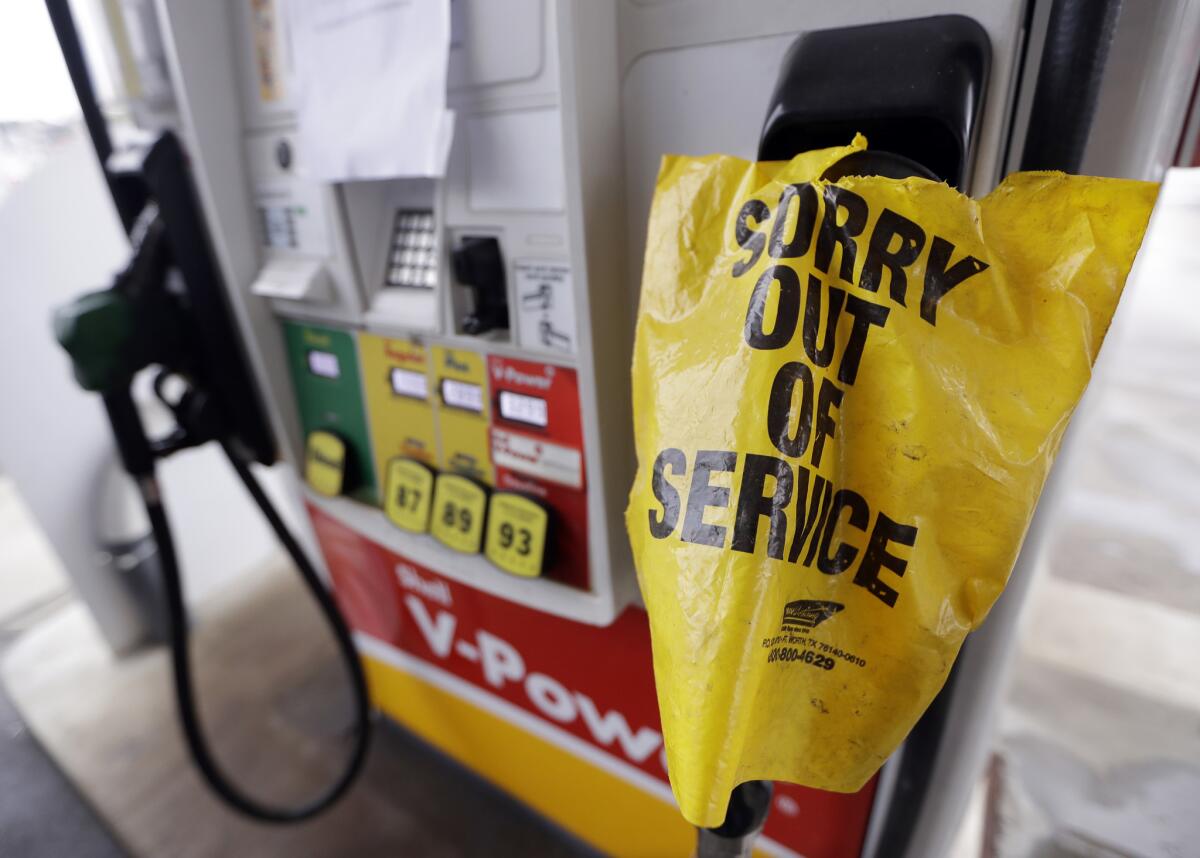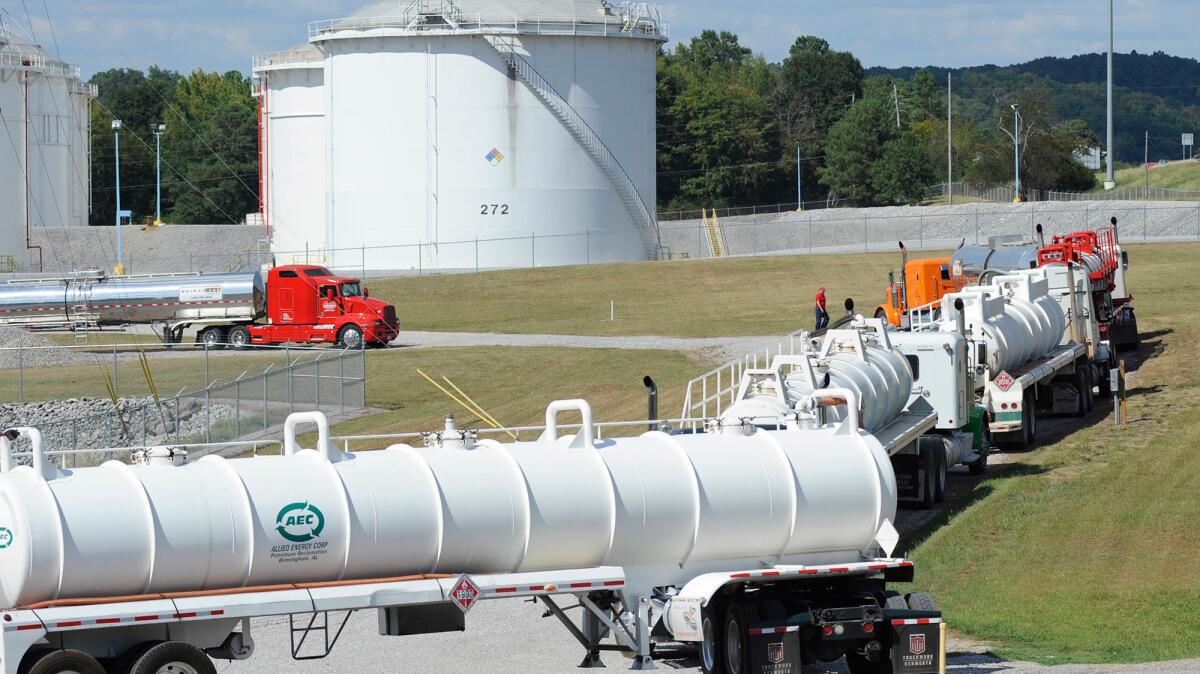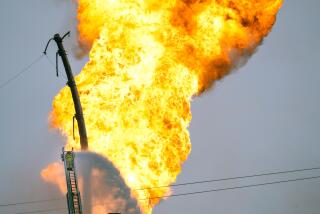Gas prices jump in the Southeast after pipeline rupture in Alabama

Reporting from Atlanta — States across the Southeast are experiencing sharp jumps in gas prices after a major gasoline pipeline ruptured in central Alabama, spilling as many as 336,000 gallons of fuel upstream from a national wildlife refuge. But thanks to a few strokes of luck, the environmental damage is minimal.
The pipeline breached near an old coal mine pit, and much of the fuel flowed into a water retention pond.
With local streams dry -- much of central Alabama is suffering from moderate to severe drought -- the gasoline did not find its way down into the Cahaba River, home to 64 rare and endangered plant and animal species, including the Cahaba lily.
“We really did bypass the bullet,” said Myra Crawford, executive director at Cahaba Riverkeeper, which has been monitoring the area by canoe and foot.“It could have been horrible. If the oil had flowed into the river, where our lilies grow, it would have contaminated one of our state treasures. It could have flowed down through Alabama and into the Mobile Bay.”
The leak was discovered Friday when a mining inspector detected a strong odor of gasoline at a mining property in a remote area of Shelby County, about 30 miles south of Birmingham.
It came from Colonial Pipeline’s Line 1, a 3-foot-wide pipe that typically transports 1.3 million barrels of gasoline a day from Houston refineries to distribution centers across the Southeast and all the way up to Linden, N.J. Built in 1964, the pipeline provides the East Coast with up to 40% of its gasoline supply.

The Alpharetta, Ga.-based company immediately shut down the pipeline. Last week, crews began removing gasoline and water from the retention pond to temporary storage tanks. Underflow dams were constructed and a boom was installed to ensure that no fuel traveled into a dry creek bed that runs from the pond to Peel Creek, which flows into the Cahaba River.
More than 700 people are now working at the site, attempting to excavate and repair the damaged section of pipe as well as construct a temporary line to bypass the leaked section.
So far, hardly any wildlife seems to have have perished as a result of fuel exposure: “A few very small mammals, one bird, a snake,” Crawford said. “Most of the damage has been to the pipeline itself and to the people who need gas for their cars.”
Over the weekend, drivers in Alabama, Georgia, Tennessee and the Carolinas faced longer lines at the gas pumps and, in some cases, dry pumps.
In Georgia, the average price of a gallon of regular gas jumped from $2.09 on Tuesday to $2.31 on Sunday, according to GasBuddy.com, a consumer-driven website that helps drivers find cheap gas. Over the weekend, GasBuddy customers reported a Super Express gas station in Evans, Ga., charging $3.49 and an Exxon station in McLean, Va., charging $3.19.
Colonial is still transporting gasoline from Houston to western Alabama. In an effort to minimize gas shortages farther north, the company is moving gasoline through a second pipeline that runs alongside the burst line and usually carries diesel and jet fuel.
Last week, the governors of Alabama, Georgia, Tennessee, South Carolina, North Carolina and Virginia issued executive orders that temporarily suspended various state and federal regulations to allow truck drivers to work longer shifts to deliver gasoline. “The uninterrupted supply” of gas is an “essential need for the public and any perceived shortage threatens the public welfare,” Georgia Gov. Nathan Deal said in his order.
As consumers in many parts of the Southeast rushed to fill up their tanks, some gas stations ran out of fuel. Emergency management officials in some states urged consumers not to panic.
“Tennessee’s consumers need to maintain their normal driving and fuel buying habits,” Tennessee Emergency Management Agency director Patrick Sheehan urged in a statement Saturday. “If consumers fill up unnecessarily, top off their tanks when they aren’t close to empty, and fill multiple containers at the pumps, then our petroleum retailers will not be able to keep up with the demand of the fuel supply.”
The spill comes at a crucial time for the oil industry. Thousands of Native American protesters have gathered in North Dakota in recent weeks to block construction of the new Dakota Access pipeline. They argue that the pipeline would pass through sacred sites and burial ground, and that any future spills could be culturally and economically catastrophic.
In Alabama, Cahaba Riverkeeper praised Colonial for its transparency, noting that within an hour of hearing of the leak the company invited the group to monitor the damage.
“That’s very unusual,” Crawford said, noting that her group had begun to forge a relationship with the oil company in the last year. “I keep thinking this is a good time where oil and water mixed.”
Jarvie is a special correspondent.
ALSO
New York bomb that injured 29 was ‘obviously an act of terrorism,’ governor says
Hanjin bankruptcy is the tip of the iceberg for flailing shippers
More to Read
Sign up for Essential California
The most important California stories and recommendations in your inbox every morning.
You may occasionally receive promotional content from the Los Angeles Times.











